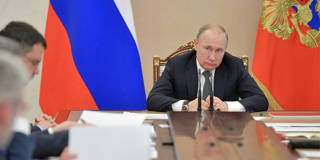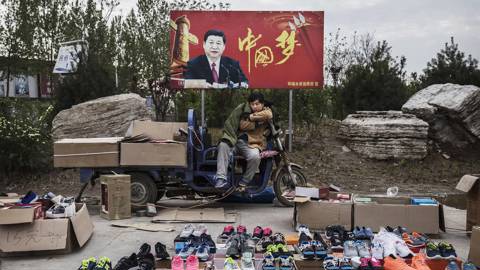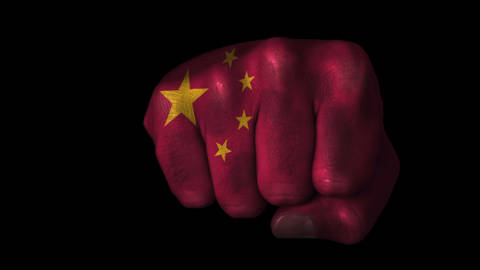Sergei Guriev
Says More…
This week, Project Syndicate talks with Sergei Guriev, a former chief economist of the European Bank for Reconstruction and Development and a professor at Sciences Po in Paris.
Project Syndicate: Last December, you predicted that the reality of ordinary Russians’ “empty refrigerators” would eventually “overwhelm the eternally optimistic messages coming from their televisions and computers, and the foundations of [President Vladimir] Putin’s informational autocracy” would “begin to crumble.” With the COVID-19 crisis having pushed Putin’s approval rating to an all-time low, has the moment of reckoning arrived?
Sergei Guriev: Putin’s low approval ratings do not bode well for his leadership. His recent decision to schedule the constitutional reform vote – essential to reset term limits, thereby enabling him to run for two more six-year terms after 2024 – for July 1 shows that he is well aware of the danger he faces.
The vote was previously planned for April 22, but surging COVID-19 infections forced it to be postponed. Yet Russia hardly has the outbreak under control; the number of daily new infections and deaths in Russia remains high. Nevertheless, Russians will head out to vote in a week.
Putin could have set the referendum for Election Day in September, when Russia traditionally holds national and local elections. But that would have meant that independent observers would be present at the ballot counting. And a new law explicitly bars such observers from this vote on constitutional amendments.
Moreover, Putin knows that his chances of securing a positive outcome are declining. Polls conducted in April indicated that about half of the electorate opposed the constitutional reform. Judging by Putin’s approval ratings, this share has most likely grown larger. Despite his grip on Russia’s information channels, Putin is no longer confident that he has the support of a majority of its citizens.
PS: Of course, Putin has already laid the groundwork to safeguard his power and extend his rule. You wrote in January that the constitutional changes he recently made were essentially moot, because even a “dramatic overhaul of political institutions implies no change in Russia’s political regime.” But if popular support for Putin continues to decline, could that change? Would elites begin to desert him?
SG: This is an existential crisis for Putin’s regime. The World Bank and the OECD expect Russia’s GDP to shrink by 6-8% in 2020, returning to 2019 levels only by 2023. While oil prices have recovered somewhat, they are not likely to return to 2019 levels any time soon, either.
Furthermore, Putin’s wavering response to the COVID crisis has severely dented his strongman image, which is vital to maintain public and elite support. After all, Russia’s handpicked elites are loyal to Putin because they believe their power and privilege depends on it. If his approval ratings fall too low, they may begin to reckon that he is more of a liability than an asset.
Nonetheless, it is very difficult to predict when and how regime change will occur. Deeply entrenched yet brittle regimes like Putin’s can collapse overnight, but they can also survive for decades.
PS: Moving away from Russia, in 2018, Danny Leipziger, Jonathan D. Ostry, and you proposed concrete steps to support more sustainable and broadly shared economic prosperity, from ensuring fair competition to strengthening social protection. As the world confronts the prospect of a severe economic recession, a protracted pandemic, and rising social tensions in many countries, will an inclusive, sustainable growth agenda gain more traction or lose ground?
SG: An “inclusion agenda” like the one we proposed is even more important today than it was in 2018. As a recent study, co-authored by Ostry, shows, pandemics have always increased inequality. (That study used data from 175 countries, starting in the 1960s. It thus covered the five pandemics that occurred this century: severe acute respiratory syndrome in 2003, H1N1 or “swine flu” in 2009, Middle East Respiratory Syndrome in 2012, Ebola in 2014, and Zika in 2016.)
This finding is likely to be borne out by the current pandemic. Lockdown is far easier to weather if you have a “cognitive” job, a comfortable home, savings, and an Internet-connected computer for each family member. And you are more likely to survive the virus if you previously had access to quality health-care services. Having a job that offers paid sick leave also helps considerably.
Those who already lack these advantages are more likely to get sick, struggle to secure adequate care, and lose their jobs or incomes. In the United States, nearly 40% of workers in households earning $40,000 or less annually have lost work in March or beginning of April, compared with 13% in households earning more than $100,000.
The green agenda will also gain more traction due to the pandemic. It is undeniable that the economic and human costs from COVID-19 are tremendous. With scientists warning that unmitigated climate change is likely to trigger more pandemics in the future, the case for climate action will only grow stronger.
BY THE WAY. . .
PS: Putin has seized on the ongoing upheaval in the US as part of his long-term effort to discredit Western governments. That approach has helped him regain flagging popular support in the past, but how effective is it likely to be today, as Russians struggle with a contracting economy, low oil prices, and an escalating virus outbreak?
SG: Russia’s propaganda machine is always eager to latch onto a problem in the West – and especially in the US. Russian state media are milking every revelation of police violence, report of looting by protesters, and Twitter “censorship” of President Donald Trump. Such news lends itself to the old Soviet logic of “whataboutism”: while Russian life and leaders are not perfect, the alternative is not particularly attractive, either.
The truth, however, is that Russian police torture and kill citizens of all races and ethnicities. The government has also crushed pro-democracy protests, though the demonstrators have always been non-violent. More fundamentally, given those aforementioned empty refrigerators, Russian propagandists’ “whataboutism” is likely to be less effective today than it has been in the past.
PS: You have argued, together with Emeric Henry and Ekaterina Zhuravskaya, that “fact-checking can staunch the flow of false information” on social media, “as can the imposition of small costs such as requiring an additional click to confirm a user’s willingness to share news.” What would this mean for the platforms themselves? Does Twitter’s recent decision to label false or misleading information, including by US President Donald Trump, go far enough?

Subscribe to PS Digital
Access every new PS commentary, our entire On Point suite of subscriber-exclusive content – including Longer Reads, Insider Interviews, Big Picture/Big Question, and Say More – and the full PS archive.
SG: Our paper, written before Twitter’s recent policy changes, was based on a randomized online experiment we ran in France in 2019. It offers a powerful justification for Twitter’s actions.
For starters, when Trump falsely claimed that there is “NO WAY (ZERO!) that Mail-In Ballots will be anything less than substantially fraudulent,” Twitter added a blue link urging readers to “get the facts.” Our research suggests that this may have substantially reduced circulation of that tweet on social media.
In our experiment, those who clicked on a fact-checking link were 67% less likely to share the original misleading content. More striking, those who did not click on the fact-checking link – 60% of all participants – were 50% less likely to share the content. In other words, people did not need to read about why the original content was false or misleading; it was enough to see that it had been flagged.
Days later, Twitter hid a tweet from Trump that included the threat, “when the looting starts, the shooting starts,” behind a label warning that it violated the platform’s rules against glorifying violence. Our research indicates that this move – which required users to click the “view” button to view the original tweet – could have reduced views by 75%.
PS: Your recently published research with Nicolas Ajzenman and Cevat Giray Aksoy shows that exposure to so-called transit migration increases prejudice and anti-foreigner sentiment, reduces trust in institutions, boosts aversion to risk, and decreases entrepreneurship among the local population. What steps can policymakers take to address these effects, especially at a time when a pandemic and an economic crisis are compounding the stress on local populations?
SG: Our paper – which covers nearly 1,000 localities in 18 transit countries – is the first to examine the impact of the 2015 refugee crisis on communities in multiple countries. As Elias Papaioannou and I show in Section 7 of our survey of research on populism, the political implications of immigration are not always straightforward and depend on the nature, intensity, and composition of immigration flows. Per Gordon Allport’s famous “contact hypothesis,” the political effects are also shaped by the extent to which the local population has direct contact with immigrants. More engagement increases empathy toward newcomers and reduces support for populists. By this logic, transit migration is unlikely to lead to positive sentiments. Nicolas, Cevat, and I confirmed just this in our paper.
If policymakers are to manage the next refugee crisis better, they must pay attention to this phenomenon. One specific step they can take is to ensure adequate social and economic support for communities located along transit routes, especially during an economic downturn.
PS: Following Alberto Alesina’s recent death, you retweeted a quote by him: “The benevolent social planner doesn’t exist.” What did you mean by that? At a time when a more benevolent state with stronger social safety nets seems to be the only hope for so many, should we really be worried about Hayek’s road to serfdom? If so, what can be done to encourage benevolent outcomes, even if social planners are not motivated by benevolence?
SG: I had the honor and good fortune to know Alberto as a colleague and as a friend. I still cannot believe that he is no longer around. And I think that we have not yet fully realized how important his contributions to the profession are.
I retweeted this quote because this sentiment is an important part of Alberto’s legacy. Political economists should always question the government’s benevolence (as well as its omniscience and omnipotence). Living in France, I have noticed that this attitude does not come easily to the French, who, by and large, believe in benevolent government. It does, however, come naturally to Italians and Russians. This may partly explain why there are so many good Italian and Russian political economists (with many of Alberto’s students among them).
As for avoiding the road to serfdom, it is not rocket science. We need to protect democratic institutions, checks and balances, and political competition, in order, ultimately, to ensure the government’s accountability.
Guriev recommends
We ask all our Say More contributors to tell our readers about a few books that have impressed them recently. Here are Guriev's picks:
-
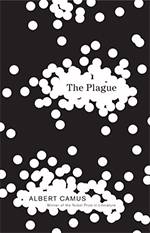
The Plague
by Albert Camus
It may not be a particularly original choice during lockdown, but this fictional 1947 account of a plague sweeping the French Algerian city of Oran is worth reading. It reminds us that this is not the first and, unfortunately, probably not the last epidemic humanity will face.
-
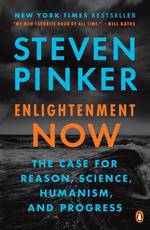
Enlightenment Now: The Case for Reason, Science, Humanism and Progress
by Stephen Pinker
Another good book to read (or reread) in difficult times, this fact-based manifesto reassures us that the world is steadily becoming a better place.
-
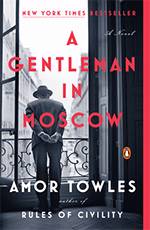
A Gentleman in Moscow
by Amor Towles
Another work of fiction, this 2016 novel shows how to preserve one’s dignity and sense of humor in very difficult circumstances (such as, say, a lockdown).
-
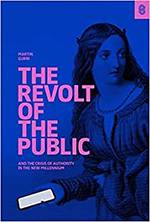
The Revolt of the Public and the Crisis of Authority in the New Millennium
by Martin Gurri
Given recent developments in the US, now is the time to read (or reread) this 2014 book, which explores the political implications of widespread access to mobile broadband Internet. In fact, Gurri predicted many of the events of the last six years – including Trump’s improbable rise and the Brexit campaign’s success – and has recently released an updated edition examining them. A 2019 paper I wrote with Nikita Melnikov and Ekaterina Zhuravskaya, based on a large global dataset, provides quantitative evidence for Gurri’s main thesis: that digital devices and a vast information sphere can undermine confidence in authorities.
From the PS Archive
From 2014
Guriev tabulates the direct and indirect costs of Russia’s intervention in Ukraine. Read more.
From 2017
Guriev presents a new growth model for Europe’s neighborhood, focused on infrastructure investment, environmental sustainability, and improved governance. Read more.
Around the web
In Sciences Po’s web series Focus, Guriev succinctly explains that democracy must be built tweet by tweet – that is, in the information sphere. Watch the video.
In a live discussion for the Carnegie Endowment, Guriev urges the Kremlin to pursue a more ambitious response to the COVID-19 crisis, including direct payments to all Russian citizens and more aggressive use of Russia’s massive reserves. Watch the video.
